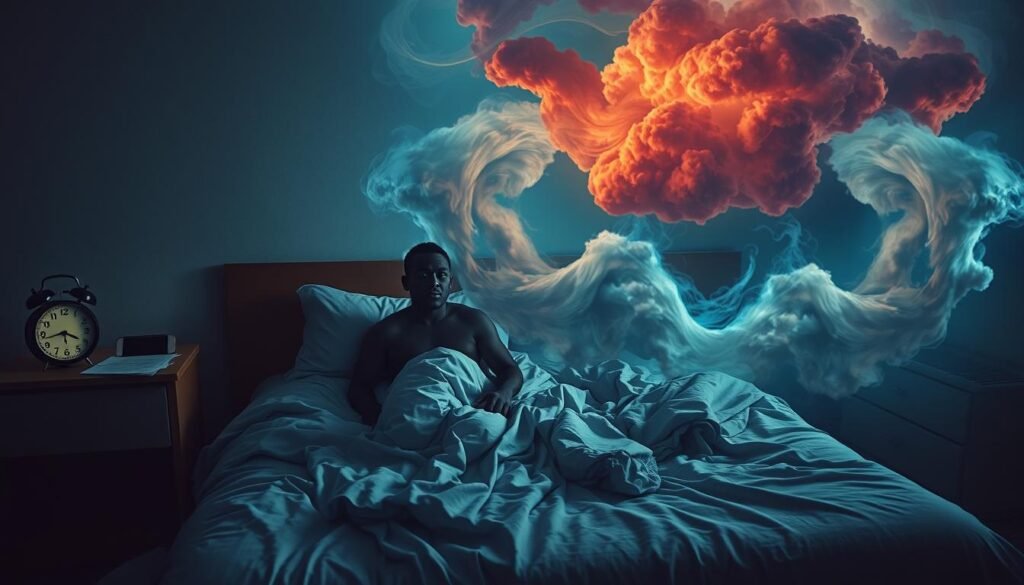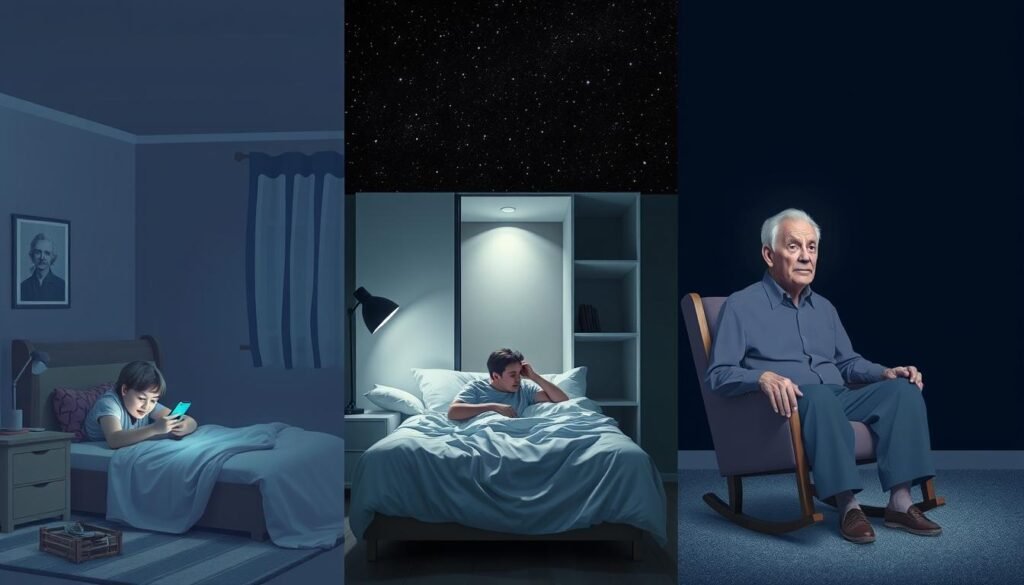About 10% of adults globally struggle with insomnia, and up to 30% show symptoms at times. These figures highlight how common sleep issues are. Recognizing what medical issues trigger insomnia is crucial. Most adults need 7 to 9 hours of sleep every night to stay healthy. Unfortunately, many don’t get enough sleep due to various factors. This piece will look into illnesses that can cause insomnia. It stresses the need to understand how health problems relate to poor sleep. With knowledge from trusted sources, readers will learn about the causes and treatments of insomnia. This can help improve sleep.
Key Takeaways
- Roughly 10% of adults globally are affected by insomnia.
- Chronic insomnia can last for three months or more and is linked to stress.
- Mental health disorders, such as anxiety and depression, significantly contribute to sleep issues.
- Older adults are more likely to experience insomnia, with around 50% reporting sleep disturbances.
- Identifying the medical reasons for insomnia can lead to effective treatments and improved sleep quality.
Understanding Insomnia
Insomnia affects many people, making it hard for them to sleep, stay asleep, or waking up too early. It impacts how well they function during the day. In the UK, around 1 in 3 people experience some level of insomnia.
Adults usually need 7 to 9 hours of sleep each night. Insomnia can disturb this, leading to daytime tiredness. Signs of not sleeping well include feeling irritable, tired, and having trouble focusing. Insomnia’s causes include stress, anxiety, and environmental factors such as loud sounds or the room’s temperature.
There are two main kinds of insomnia: acute and chronic. Acute insomnia is short-lived, while chronic insomnia lasts much longer. Chronic insomnia often results from other sleep issues or health problems. It’s more common in women and older adults.
To improve sleep, making some lifestyle changes is helpful. Try not to take naps and avoid heavy exercise before bedtime. Cognitive Behavioral Therapy for Insomnia (CBT-I) is also a great treatment for lasting results.
Common Symptoms of Insomnia
Insomnia can show up in many ways, so it’s key to spot its signs early. The main signs are trouble falling asleep, staying asleep, or waking up too early. People dealing with these issues might feel very tired during the day. This tiredness can really affect their daily activities. They may also feel grumpy, have mood swings, and find concentrating hard.
Adults usually need between 7 to 9 hours of sleep each night. When they don’t get enough, about 23% feel less able to do things during the day. Kids and teenagers need even more sleep, from 9 to 13 hours. Toddlers need about 12 to 17 hours. Feeling tired all the time could mean you’re not getting enough sleep. It’s crucial to notice and do something about these symptoms.
About 30% of adults have some type of insomnia, with 10% dealing with it for more than three months. Women tend to experience insomnia more than men. Stress, anxiety, and other health issues can increase insomnia symptoms. For help, looking at resources like insomnia treatment options is a good step. It’s important to talk to a healthcare professional for the right approach.
What Sickness Causes Insomnia?
Looking into sicknesses that cause insomnia helps explain why some people can’t sleep. Many health problems link to chronic insomnia, impacting sleep and well-being. By diving into these causes, we get why certain health and mental issues make sleeping hard.
Chronic Insomnia and Its Connection to Health Conditions
Chronic insomnia often goes hand in hand with various health problems. For instance, people with diabetes or heart issues might struggle with sleep. About 55% of those with such chronic conditions report insomnia. This shows how crucial it is to tackle these health problems to sleep better.
Physical Illnesses Causing Insomnia
Many physical illnesses can lead to not sleeping well. For example:
- 55% of people with stomach issues also face sleep problems.
- Heart failure can make breathing hard at night, disrupting sleep.
- Being overweight can lead to sleep apnea, making someone wake up often.
- Needing to go to the bathroom a lot at night disturbs sleep for many older people.
Mental Health Disorders and Their Role
Mental health issues greatly affect sleep, emphasizing the need for overall care. Almost 90% of those severely depressed also struggle with insomnia. Anxiety, panic attacks, and PTSD can greatly interfere with sleep. Plus, those with generalized anxiety disorder, which is about 3% of folks, worry so much it keeps them awake. Understanding these impacts helps in finding better ways to help and treat insomnia.
Stress and Sleep Disturbances
Stress and sleep problems are closely connected. When stress levels are high, calming down and falling asleep can be tough. Hence, managing stress is key to better sleep and lessening insomnia signs.
How Stress Affects Sleep Quality
About 10% to 15% of adults struggle with insomnia, causing daytime issues like tiredness and crankiness. Stressful situations, like work troubles or personal issues, can trigger insomnia. High stress can also lessen the amount of deep, refreshing sleep we get.
Chronic Stress as a Trigger for Insomnia
Chronic stress is when symptoms show up three times a week for three months. It can start a cycle that wrecks sleep quality. This leads to tiredness during the day and more health problems, like high blood pressure and diabetes. These issues can make sleeping even harder.
To learn more about stress and sleep, check out this resource. Knowing how stress impacts sleep and handling it well is critical for good sleep and health.

Impact of Lifestyle on Sleep
Lifestyle choices significantly affect our sleep. Having an irregular sleep schedule messes with our natural rhythm. It becomes hard to fall and stay asleep. Too much screen time before bed also makes it tough to sleep. The blue light from screens can block melatonin, which we need for sleep.
Drinking caffeine too late can also make sleeping hard. If you have caffeine in the afternoon or evening, getting good sleep can be hard. It’s important to understand how our lifestyle affects our sleep. This is especially true for those having trouble sleeping.
To improve sleep, adopting good sleep hygiene is key. Here are some helpful tips:
- Maintaining a consistent sleep schedule by going to bed and waking up at the same time.
- Creating a bedtime routine that promotes relaxation, such as reading or taking a warm bath.
- Minimizing exposure to screens, especially during the hour before sleep.
- Avoiding heavy meals and caffeine close to bedtime.
To sleep better, we need to look at our lifestyle choices. Making small changes to prioritize sleep can help a lot. These changes often lead to better sleep quality.
Medications That Interfere With Sleep
Knowing how medications affect sleep is key for those battling insomnia. Some prescription meds can help, but they might also disturb sleep. It’s important to look into common meds that could disrupt sleep, especially if they have serious side effects.
Prescription Drugs Linked to Insomnia
Many prescription medications for insomnia are known to mess with sleep. For example, SSRIs used for depression can change sleep stages. This change might cause people to wake up often at night. Corticosteroids can energize you, leading to trouble sleeping. Stimulants for ADHD can also make it hard to sleep, showing why talking with doctors about your meds is crucial.
Over-the-Counter Medications and Sleep Disruption
Even over-the-counter sleep aids can cause problems. Certain antihistamines and cold meds, like pseudoephedrine, may lead to insomnia because of their stimulating effects. It’s essential to know how these over-the-counter sleep aids might affect your sleep. If you frequently use them, talk to experts and look at how you can improve your sleep. For more information, check out the different medications that can cause insomnia.

Sleep Disorders Contributing to Insomnia
Sleep disorders significantly affect those struggling with insomnia. Key issues like sleep apnea and restless legs syndrome play a major role in sleep disruption. Addressing these can improve sleep quality and well-being.
Understanding Sleep Apnea
About 18 million adults in the U.S. face sleep apnea. It causes breathing to stop and start during sleep. This leads to poor sleep quality. People with this condition often feel very tired during the day. They find it hard to get good sleep. This issue greatly affects one’s daily life and health.
The Role of Restless Legs Syndrome
Restless legs syndrome is also linked to insomnia. It makes people feel they must move their legs, especially when resting or at night. This feeling makes it hard to relax and sleep. The discomfort worsens insomnia, making good sleep hard to achieve.
| Sleep Disorder | Percentage Affected | Key Symptoms |
|---|---|---|
| Sleep Apnea | Approximately 6% of adults | Interrupted breathing, daytime fatigue |
| Restless Legs Syndrome | About 7-10% of adults | Urge to move legs, discomfort during inactivity |
| Insomnia | 30-50% of adults at some point | Trouble falling asleep, daytime impairment |
Insomnia in Different Age Groups
Insomnia hits people of all ages but shows up differently in adults and kids. When we look at insomnia across ages, we uncover important info. This info shows how sleep issues change as we get older.
Effects of Aging on Sleep Patterns
As people age, their sleep changes a lot. About one-third of adults suffer from insomnia symptoms at times. And, 10 to 15 percent of them have it bad enough that it messes with their daily life. Older folks might have a hard time staying asleep.
More than 50 million Americans deal with sleep disorders. Many older folks have to deal with sleep apnea. This problem needs special care, especially for the elderly.
Insomnia in Children and Teenagers
Kids suffering from insomnia often have behavioral challenges or stress at home. About 10 to 30 percent of kids go through this. Teens, dealing with their own issues, hardly get enough sleep during school days. Less than eight hours is common.
Academic and social pressures can really mess with their sleep. This lack of sleep among young people is a serious issue for public health.

| Age Group | Prevalence of Insomnia | Common Issues |
|---|---|---|
| Children | 10-30% | Behavioral insomnia |
| Teenagers | Approximately 30% | Academic and social pressures |
| Adults | About 30% | Chronic insomnia, daytime consequences |
| Older Adults | Over 50% | Sleep apnea, age-related sleep disorders |
Physical Health Conditions Associated with Insomnia
Physical health problems can greatly upset our sleep, causing insomnia and other health issues. Chronic pain and diabetes are big factors in sleep troubles, making insomnia harder to tackle. Knowing how these conditions affect sleep helps in solving the problem.
Chronic Pain and Its Impact on Sleep
Chronic pain and sleep problems are closely linked. People with chronic pain struggle to sleep well. Their pain makes it hard to get comfortable and stay asleep. This issue is both physical and mental.
Research shows that most people with chronic insomnia also have pain. To feel better all around, it’s key to manage both pain and sleep issues.
Diabetes and Insomnia Connections
Diabetes also messes with sleep. The link between diabetes and insomnia gets worse with symptoms like nerve pain and hormone shifts. Diabetics may wake up often to pee, making sleep even harder. This can lead to serious health problems.
Not sleeping enough raises the risk for diseases, including heart issues and obesity. It’s important to tackle both diabetes and sleep problems to improve life quality.
| Health Condition | Impact on Sleep |
|---|---|
| Chronic Pain | Difficulty falling asleep or staying asleep due to discomfort |
| Diabetes | Nocturia and neuropathy leading to frequent sleep disruptions |
| Insomnia | Increased risk of various conditions, including heart disease and obesity |
It’s crucial to understand how physical health issues and insomnia are linked. Recognizing these connections helps create effective treatment strategies. This can lead to better health and a higher quality of life.
How Mental Health Disorders Cause Insomnia
Mental health issues and insomnia are closely linked, affecting each other deeply. Anxiety can cause racing thoughts and too much worrying. This makes it hard to fall and stay asleep. It shows why treating anxiety is key to improving sleep. Similarly, depression leads to trouble sleeping. People may wake up too early or feel tired even after sleeping.
Anxiety and Its Sleep Disruptions
Millions are hit by anxiety disorders, leading to insomnia. More than two-thirds of people with social anxiety struggle with sleep. Without addressing anxiety, sleep problems can get worse. It becomes a cycle of sleepless nights and worry. Sleep trouble is so key to anxiety that it helps diagnose it. This points to how vital treatment is for sleep problems linked to anxiety.
Depression and Its Correlation with Sleep Issues
Depression and sleep problems are closely linked. Insomnia is seen in over 90% of those with depression. Having sleep issues can also mean a higher risk of getting depression later. This ties the need to treat both insomnia and depression together. Cognitive behavior therapy for insomnia helps. It leads to better depression scores and higher healing rates. This shows the power of treating both issues together.
| Mental Health Disorder | Associated Sleep Issue | Likelihood of Insomnia |
|---|---|---|
| Anxiety Disorders | Racing thoughts, restlessness | 60-70% experience insomnia |
| Clinical Depression | Waking early, poor sleep quality | Over 90% experience insomnia |
| Post-Traumatic Stress Disorder (PTSD) | Recurring nightmares, hyperarousal | 50-70% experience insomnia |
| Schizophrenia | Circadian dysfunction, sleep disruption | More than 90% experience insomnia |
Effective Treatments for Insomnia
Many people suffer from insomnia. To fight it, a mix of lifestyle adjustments and meds works best. These methods help manage sleep problems and boost overall health.
Lifestyle Changes to Improve Sleep Quality
Making lifestyle changes for better sleep can really help. Here are some tips:
- Maintain a consistent sleep schedule by going to bed and waking up at the same time each day.
- Practice good sleep hygiene by creating a relaxing bedtime routine.
- Limit caffeine and alcohol intake in the hours before bed to avoid sleep disruptions.
- Engage in regular exercise, ideally earlier in the day, to promote better sleep.
- Create a comfortable sleep environment by reducing light and noise, maximizing comfort in bedding.
- Use relaxation techniques such as meditation, deep breathing, or gentle yoga to reduce stress and ease into sleep.
These steps can help you develop better sleeping habits and fight insomnia.
Medications and Their Usage for Insomnia Treatment
While changing habits is key, some may need insomnia medication options. Doctors suggest different meds depending on each person’s case:
| Medication Type | Examples | Considerations |
|---|---|---|
| Benzodiazepines | Temazepam, Lorazepam | High potential for dependence; usually a short-term solution. |
| Non-benzodiazepines (Z drugs) | Zolpidem, Eszopiclone | Effective for sleep initiation but carry risk of tolerance. |
| Melatonin receptor agonists | Ramelteon | Generally milder effects; less risk of dependence. |
| Orexin receptor antagonists | Suvorexant | Targets both sleep onset and maintenance; possible side effects. |
| Off-label medications | Some antidepressants, antipsychotics | May offer unique benefits but require a careful discussion with a healthcare provider. |
Talk to your doctor to find the best effective treatments for insomnia for you. Combining self-care with expert advice is key to better sleep.
Preventing Insomnia: Best Practices
It is very important to have strategies to stop insomnia for good sleep health. By focusing on several important practices, people can improve their chances of getting deep sleep every night.
Importance of a Regular Sleep Schedule
Having a set sleep schedule helps improve sleep. Going to bed and waking up at the same times daily helps the body get into a natural sleep rhythm. This makes it easier to fall asleep and wake up feeling good. Sticking to a regular sleep schedule helps keep the body’s internal clock on track, warding off insomnia.
Creating a Sleep-Conducive Environment
Creating a nice place to sleep is key to fighting insomnia. Here are tips to make your sleeping area better:
- Reduce noise with white noise machines or earplugs.
- Keep the room cool, between 60-67°F (15-19°C).
- Use blackout curtains or eye masks to keep it dark.
- Choose a comfortable mattress and pillows for better sleep.
- Don’t bring electronic gadgets into your sleeping area.
Conclusion
Insomnia is a complicated issue influenced by many factors. It impacts a person’s ability to sleep well. Mental and physical health problems like anxiety, depression, and chronic pain have a big role. About 1 in 10 people face insomnia at some point, showing how common it is. Insomnia’s costs are huge, adding up to $100 billion a year in the U.S.
Managing insomnia starts with understanding personal situations. It’s key to recognize symptoms and link them to what causes them, like habits or health issues. Poor sleep from chronic insomnia can worsen memory and raise depression risk. So, it’s important to see how insomnia and mental health affect each other to treat it well.
To sleep better, it helps to follow good sleep habits and fix any health problems. Using relaxation techniques and making your sleeping area comfortable are good steps. By focusing on better sleep and tackling insomnia’s root causes, people can improve their health and life quality.